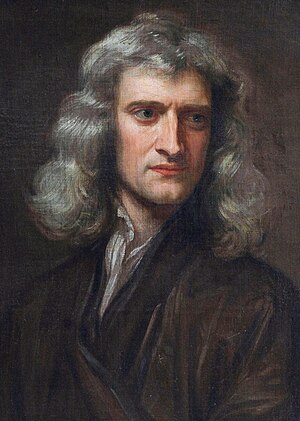Quantum Tunnel Podcast – Sir Isaac Newton (Part I)
You can download this podcast in iTunes o Feedburner.
Sir Isaac Newton’s fame as the discoverer of the law of gravitation is widespread. It can be said that his achievements have had a great influence in the creation of modern physical science.
Newton was born in 1642 to a farm family in the village of Woolsthorpe in England. In 1665, at the age of 23, an outbreak of the plague caused the universities to close, and Newton returned to his home in the country, where he remained until 1667. There, in 2 years of rustic solitude, his creative genius lead to discoveries unsurpassed in the history of human thought:
- the binomial series for negative and fractional exponents;
- the differential and integral calculus;
- universal gravitation
- the resolution of sunlight into the visual spectrum by means of a prism,
In his old age he reminisced as follows about this miraculous period of his youth: “In those days I was in the prime of my age for invention and minded Mathematicks and Philosophy more than at any time since”.
Newton was always an inward and secretive man, and for the most part kept his monumental discoveries to himself. Newton settled down in Cambridge; his mathematical discoveries were never really published in a connected form, and became known in a limited way almost by accident, through conversations and replies to questions put to him in correspondence.
It is interesting to see Newton’s correspondence with Leibnitz, through Oldenburg, in 1676 and 1677, where Newton discusses his binomial series but conceals in anagrams the ideas about calculus and differential equations, while Leibnitz freely reveals his own version of the calculus.
Not much is known about Newton’s life at Cambridge in the early years of his professorship, but it is certain that optics and construction of telescopes were among his main interests. He experimented with many techniques for grinding lenses using his own made tools, and about 1870 he built the first reflecting telescope.
In the next episode, we will continue this fascinating story, keep in touch!
News
Akatsuki failure
Japan’s fist space probe, Akatsuki, bound for Venus failed to enter the planet’s orbit. This failure seems to have happened after the probe passed Venus, but failed to slow down. Akatsuki is the second Japanese interplanetary probe whose mission ended in failure, the first happened in 1998 in a mission to Mars.
LHC plans extra year
The Large Hadron Collider is the world’s largest particle accelerator and it is used by scientist in their search for the Higgs particle, part of the mechanism that is thought to endow other particles with mass. CERN is preparing to run the LHC for an extra year in order to continue this search.
Arsenic bacteria not well received
At the beginning of December NASA announced in a well publicised press conderence that a strain of bacteria can apparently use arsenic in place of phosphorous to build its DNA, some scientists now are questioning the finding and taking issue with how it was communicated to non-specialists.
The authors of the Science paper in which the results were presented explain that the bacteria was found in Mono Lake in California and claim that this finding represents a new chemistry of life. However, other scientists such as Rosie Redfield consider these statements as premature. The big problem is that the authors have shown that the organism takes up arsenic, but they “haven’t unambiguously identified any arsenic-containing organic compounds”, says Roger Summons, a biogeochemist at the Massachusetts Institute of Technology in Cambridge.
California approves first US carbon-trading scheme
California has become the first US state to approve a carbon-trading plan aimed at cutting greenhouse emissions. State regulators passed a “cap-and-trade” framework to let companies buy and sell permits, giving them an incentive to emit fewer gases.
The scheme means that from 2012 California will allocate licences to pollute and create a market where they can be traded. A company that emits fewer greenhouse gases than its permits allow, could sell the extra capacity to a dirtier firm. By making over-polluting more expensive, the scheme aims to provide incentives to develop greener technology.
Brazilian rocket launch
Brazil has recently successfully launched into space a mid-sized rocket developed domestically. The rocket carried a number of experiments on weightlessness and it was recovered at sea after a short flight.
The VSB-30 rocket, developed with domestic technology by researchers at Instituto de Aeronutica e Espaço and it was launched from Alcantara, a spaceport that Brazil operates in the Amazon near the border with Ecuador.

“We live only to discover beauty. All else is a form of waiting.” ~ Kahlil Gibran
Everything should be made as simple as possible … but not simpler.
Pingback: Sir Isaac Newton (Parte I) – Quantum Tunnel en Español | Quantum Tunnel
Pingback: Sir Isaac Newton (p. II) – Quantum Tunnel Podcast | Quantum Tunnel
Comments are closed.